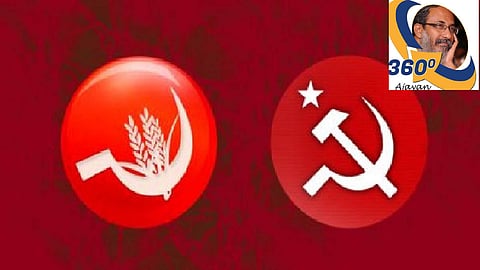

#Ajayan
A glimpse into history is timely, as the current turmoil in the Left, born of its own machinations, renders SA Dange, the figure who crystallized the 1964 split of the Communist Party of India, profoundly relevant even after 60 years.
On April 11, 1964, thirty-two members walked out of the CPI National Council meeting and formed the Communist Party of India (Marxist). Dange, who led the undivided CPI, favoured supporting the Congress Government of Pandit Jawaharlal Nehru, a stance blessed by the Communist Party of the Soviet Union.
The breakaway faction, convinced that China was the true beacon of the global Left movement, remained unperturbed by the 1962 Chinese aggression. EMS Namboodiripad's controversial position that the aggression was over territory “China claims belongs to it while India claims otherwise” hinted at the emerging schism and the shifting allegiances within the Left.
The Congress, which wilted under two continuous terms of Narendra Modi’s BJP Government, has once again emerged as a focal point, sending ripples through the political landscape, particularly affecting the CPI(M) in Kerala, its last and only bastion. The sting of an inglorious defeat at the Lok Sabha hustings has only exacerbated the situation, intensifying the challenges faced by the party.
On the national stage, the Congress has re-emerged as a formidable force, poised to lead an Opposition front against the BJP whose policies and ideologies stand in stark contrast to the CPI(M)'s principles. The Left is compelled to join the grand anti-BJP alliance led by the Congress.
CPI(M) general secretary Sitaram Yechury has publicly declared that forging an alliance with the Congress is now the path forward for the Opposition. This certainly resonates with the long-past but prescient idea of Dange which was six decades ago rejected by a faction that eventually formed the CPI(M).
Despite this reality, the Kerala leadership of the CPI(M), spearheaded by Chief Minister and politburo member Pinarayi Vijayan, holds a divergent view. It is reported that during the recent party central committee meeting to analyze the poll debacle, Vijayan and his cohorts from the State claimed the party's dismal performance in Kerala during the Lok Sabha elections was a direct consequence of the national-level alliance with the Congress.
The horrid performance of the Pinarayi-led government has been a significant factor in the LDF's defeat. A series of corruption charges against the government, its extravagance even as the State grapples with a financial crisis and struggles to pay overdue welfare pensions and the violence unleashed by the youth and student wings of the party, all contributed to public ire during the polls.
Adding to the woes were the Chief Minister's arrogant demeanor, his justification of the violence and misdeeds and his affinity for the affluent, distancing himself from the common people and the working class. All this voter discontent was starkly reflected in the post-election analysis during party meetings, spanning from the grassroots to the district level.
Even as the party's central leadership acknowledges that a significant portion of the CPI(M)’s once-loyal base has shifted towards the BJP, it emphasizes the need for a return to grassroots engagement and cautions against the current trend of leaders distancing themselves from the people.
However, the State wing appears to turn a blind eye to these concerns. This is evident in the repeated assertions by the party's State secretary that there is no need to reconsider the Chief Minister's style. Instead, the leadership plans to engage with the public to dispel what they term as 'misconceptions’. It still believes or tries to make believe that fault lies with the people.
As for the CPI, a partner of the LDF, it has taken to realpolitik and publicly denounced the CPM student wing and its leaders have spoken against the functioning of the Chief Minister, hinting at a possible departure from the LDF and a return to the UDF. This move harkens back to 1969 when the CPI joined the UDF, leading to a period of stable governance under its leader, C Achutha Menon, as Chief Minister.
However, after the Emergency, the CPI became part of the LDF and has remained so despite the ‘big brother’ attitude of the CPI(M). With the Congress-led INDIA alliance showing bright prospects at the Centre, aligning with it becomes practical politics, validating what its leader Dange once proposed.
Thus, the crux of the issues lies solely with the CPI(M). The all-powerful Kerala unit steadfastly refuses to align with the central leadership, which echoes Dange's vision. Party insiders reveal that it is the 'wealthy' State unit that 'sustains' the central leadership, implying that if the leaders there persist with their pro-Congress stance, the central leadership will face significant challenges.
For the State unit, its aspirations of courting the Muslim League have faded away. After two consecutive terms in office, a third term seems precarious, especially if the CPI decides to exit, potentially leading to a collapse reminiscent of the party's fate in Bengal and Tripura.
